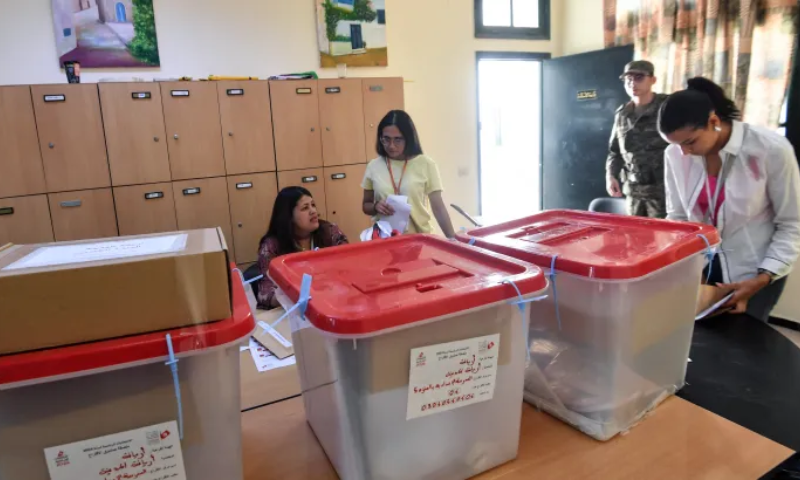TUNIS: Tunisians voted on Sunday in a presidential election widely expected to see incumbent president Kais Saied secure another five years in office while his main critics — including one contender — are behind bars.
Three years after Saied’s controversial power grab that altered the country’s democratic landscape, the election is seen as a closing chapter in Tunisia’s short-lived experiment with democracy.
The Independent High Authority for Elections (ISIE) reported that approximately 9.7 million citizens were eligible to vote, with polling stations across the country witnessing a turnout largely composed of older voters.
According to ISIE, around 47 percent of the electorate falls between the ages of 36 and 60, and initial reports suggested a “considerable attendance” in the early hours of the voting process.
At a central Tunis polling station, voters queued to show their support for Saied. “I came to support Kais Saied,” said 69-year-old Nouri Masmoudi, expressing a sentiment shared by many older voters. Meanwhile, Fadhila, a 66-year-old voter, stated her decision to vote was “in response to those who called for a boycott.”
Polling station officials reported steady voter turnout in the capital. Noureddine Jouini, the director of a station in central Tunis, said that “a good influx of voters” had arrived, mostly over the age of 40. Other polling stations, particularly in working-class neighborhoods such as Bab Jedid, saw lower turnouts, with mostly elderly men participating in the election process.
READ ALSO: Iran Prepares Response to Possible Israeli Attack: Media
Saied himself cast his vote in the affluent Ennasr neighborhood, accompanied by his wife. The station there saw what polling officials described as a “very respectable number” of voters.
Despite the relatively calm voting atmosphere, concerns linger about electoral transparency. Hosni Abidi, a 40-year-old voter in Tunis, voiced fears of potential fraud. “I don’t want people to choose for me. I want to check the box for my candidate myself,” he said.
Saied, 66, who rose to power in a landslide victory in 2019, has since reshaped Tunisia’s political system by consolidating control and rewriting the constitution. His 2021 power grab, which included dissolving the parliament and expanding executive powers, has drawn both domestic and international criticism.
Dissent has been met with a series of crackdowns, leading to the detention of over 170 persons, including opposition figures and civil society activists, according to Human Rights Watch.
Among those jailed are prominent opposition leaders such as Rached Ghannouchi, the head of the Ennahdha party, which dominated Tunisia’s post-revolution political scene. Another key figure behind bars is Abir Moussi, leader of the Free Destourian Party, who has been accused of seeking to revive the pre-revolution regime.
The political climate leading up to the election has been tense. On Friday, hundreds of protesters took to the streets in Tunis, some brandishing signs labeling Saied as a “Pharaoh manipulating the law.”
Despite the growing discontent, voters have few alternatives to Saied. The ISIE barred 14 hopefuls from running, citing technicalities such as insufficient endorsements. As a result, Saied’s main opponents are largely symbolic figures, including former lawmaker Zouhair Maghzaoui, who supported Saied’s power grab, and businessman Ayachi Zammel, who has been jailed since his candidacy was approved last month on charges of forging endorsements.
In his final campaign speech on Thursday, Saied called for a “massive turnout to vote,” framing the election as an opportunity for “reconstruction” in Tunisia. He cited an ongoing struggle against “conspiratorial forces” allegedly linked to foreign entities and accused these forces of undermining public services and disrupting developmental projects during his presidency.
Saied’s supporters, particularly among the working-class population, remain hopeful that he can steer Tunisia through its economic crisis. However, critics argue that his consolidation of power has worsened the country’s political and economic instability.
The election is set to close at 6:00 pm (1700 GMT), with preliminary results expected by Wednesday at the latest, though they may be available earlier.























